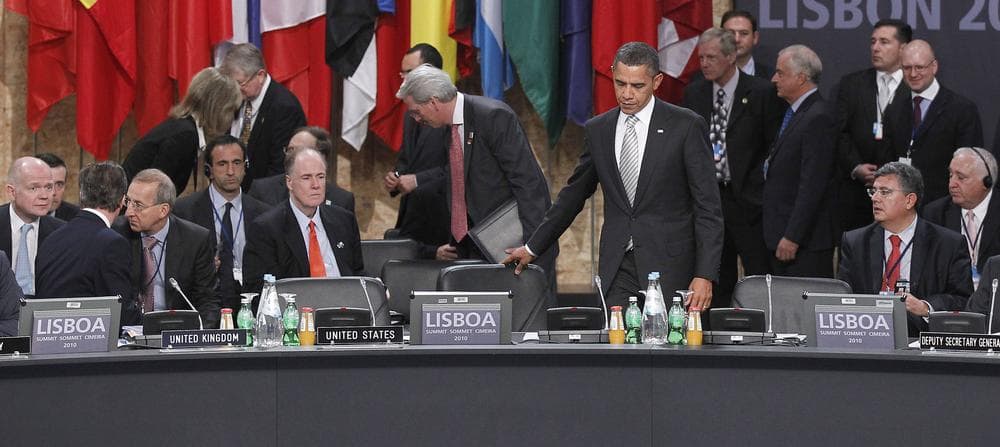Advertisement
NATO And US Differ Over Afghan Combat Exit In 2014

NATO nations formally agreed Saturday to start reducing troop levels in Afghanistan next year and hand over control of security to the Afghans in 2014. But the U.S. and its allies appeared to take conflicting views on when NATO combat operations would end.
NATO Secretary-General Anders Fogh Rasmussen said he did not expect NATO troops to stay in the fight against the Taliban after 2014.
"I don't foresee ISAF troops in a combat role beyond 2014, provided of course that the security situation allows us to move into a more supportive role," Fogh Rasmussen told reporters, using the acronym for the International Security Assistance Force that is led by NATO.
But later a senior Obama administration official says the U.S. has not committed to ending its combat mission in Afghanistan at the end of 2014. The official spoke on condition of anonymity in order to discuss internal administration discussions.
The U.S. official said a decision on changing the U.S. mission in Afghanistan is not imminent because it is still unclear what the security needs and resources will be as the 2014 transition proceeds. Each NATO member country will make an individual decision on when their combat mission will change, the official said.
The U.S. view may reflect a reluctance to forecast when combat will end, in order not to give the Taliban a sense of hope for outlasting their adversary. It may also indicate less certainty by the U.S. that Afghans will be able to take full control of comat by 2014, and perhaps a greater eagerness among the Europeans to be done with a nine-year combat operation.
Seeking to discount the apparent difference in views on combat beyond 2014, White House spokesman Robert Gibbs said that just because the U.S. hasn't decided to end its combat mission in 2014 doesn't mean it couldn't eventually do so.
On Friday, Ivo Daalder, the U.S. ambassador to NATO, told reporters that the 2014 goal and the end of NATO's combat role in Afghanistan "are not one and the same." But many NATO nations have insisted they will remove all their troops by 2014, and British Foreign Secretary William Hague reiterated that his country will end its combat role in Afghanistan by 2015.
"Make no mistake about it, that is an absolute commitment and deadline for us," the British news agency Press Association quoted him as saying.
He added: "This remains a phenomenal challenge. There is a huge amount of work to do in Afghanistan, and I wouldn't want anyone to think we can relax in any way about Afghanistan."
In Lisbon the 28 NATO member states and Afghanistan also signed an agreement for the Western alliance to remain in Afghanistan after 2014 to provide military assistance for Afghan security forces - including air support, training, advice and logistics - and to help with economic development and humanitarian assistance.
Fogh Rasmussen said the alliance will not abandon Afghanistan after 2014 because it could slip back into chaos without assistance.
"Here in Lisbon we have launched the process by which the Afghan people will become masters in their own house," Rasmussen said after NATO leaders including President Barack Obama reached a consensus on the handover date, first proposed by Afghan President Hamid Karzai last year, on the second day of Nato's annual summit in Portugal's capital.
No details were provided on the precise nature of NATO's future role beyond the security handoff.
Karzai predicted the effort will succeed "because I found today a strong commitment by the international community. This will be matched by the people of Afghanistan."
This program aired on November 20, 2010. The audio for this program is not available.